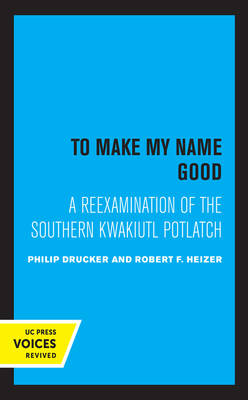
- Afhalen na 1 uur in een winkel met voorraad
- Gratis thuislevering in België vanaf € 30
- Ruim aanbod met 7 miljoen producten
- Afhalen na 1 uur in een winkel met voorraad
- Gratis thuislevering in België vanaf € 30
- Ruim aanbod met 7 miljoen producten
Zoeken
To Make My Name Good
A Reexamination of the Southern Kwakiutl Potlatch
Drucker Philip, Robert F Heizer
Paperback | Engels
€ 67,95
+ 135 punten
Uitvoering
Omschrijving
To Make My Name Good: A Reexamination of the Southern Kwakiutl Potlatch offers a definitive, lucid account of one of the Northwest Coast's most discussed--and most misunderstood--institutions. Drawing on hitherto unpublished field notes, new translations, and extended interviews with master informants Charles E. Nowell and Ed Whonnock, Philip Drucker and Robert F. Heizer revisit the Southern Kwakiutl (Kwagyul) potlatch to show how it actually worked in practice. Situating their analysis against the towering archive of Franz Boas and subsequent interpretations by Ruth Benedict, Helen Codere, and Homer Barnett, the authors clarify where classic sources privilege what people say and believe over what they demonstrably do. The result is a functionally coherent portrait of potlatch as a formal procedure of social integration--publicly identifying group membership, validating hereditary names and privileges, and reciprocally recognizing status across host and guest communities--rather than the anomaly or pathology it sometimes appears in comparative literature. Methodologically forthright, the book advances a threefold standard of "ethnographic truth" (speech, belief, practice) and demonstrates how reading across these registers resolves long-standing contradictions in the Southern Kwakiutl record. Rich case material--from sequential descriptions of ceremonies to the careful tracking of gift distribution, rank order, and name transmission--anchors a reassessment with broad implications for Northwest Coast ethnology, kinship and status studies, and the anthropology of ritual and exchange. By restoring chronology, acculturative change, and local pragmatics to the center of analysis, Drucker and Heizer provide scholars and students of Indigenous studies, museum curation, and Pacific Northwest history an indispensable corrective and a model of rigorous reanalysis. Clear, concise, and empirically grounded, To Make My Name Good shows why the Southern Kwakiutl potlatch belongs at the heart of any serious account of social order, authority, and value on the Northwest Coast. This title is part of UC Press's Voices Revived program, which commemorates University of California Press's mission to seek out and cultivate the brightest minds and give them voice, reach, and impact. Drawing on a backlist dating to 1893, Voices Revived makes high-quality, peer-reviewed scholarship accessible once again using print-on-demand technology. This title was originally published in 1967.
Specificaties
Betrokkenen
- Auteur(s):
- Uitgeverij:
Inhoud
- Aantal bladzijden:
- 172
- Taal:
- Engels
Eigenschappen
- Productcode (EAN):
- 9780520338364
- Verschijningsdatum:
- 28/05/2021
- Uitvoering:
- Paperback
- Formaat:
- Trade paperback (VS)
- Afmetingen:
- 152 mm x 229 mm
- Gewicht:
- 258 g

Alleen bij Standaard Boekhandel
+ 135 punten op je klantenkaart van Standaard Boekhandel
Beoordelingen
We publiceren alleen reviews die voldoen aan de voorwaarden voor reviews. Bekijk onze voorwaarden voor reviews.







